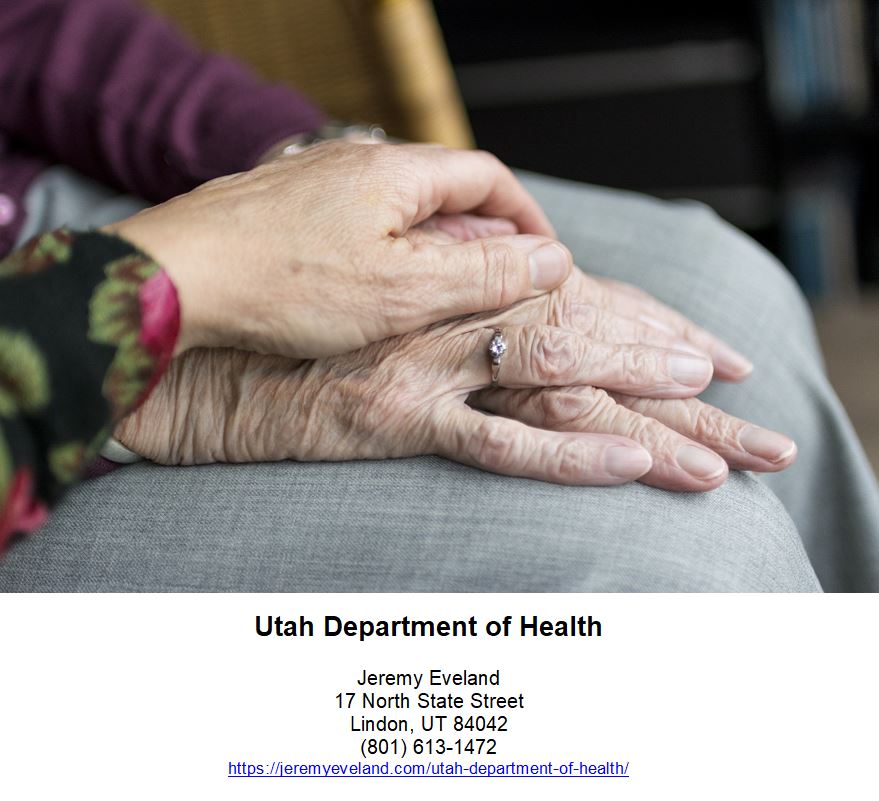-
Attorney at Law
- Introduction
- The Benefits of the Utah Department of Health’s Vaccination Programs
- Exploring the Utah Department of Health’s Mental Health Services
- An Overview of the Utah Department of Health’s Public Health Initiatives
- The Impact of the Utah Department of Health’s Nutrition Programs
- Examining the Utah Department of Health’s Substance Abuse Prevention Programs
- Q&A
“Improving Utah’s Health, One Step at a Time”
Introduction
The Utah Department of Health (UDOH) is a state agency that works to protect and promote the health and safety of all Utahns. The UDOH works to ensure that all Utahns have access to quality health care, preventive services, and health education. The UDOH also works to reduce health disparities and improve the health of all Utahns. The UDOH works with local, state, and federal partners to provide health services and programs that meet the needs of Utahns. The UDOH also works to ensure that all Utahns have access to quality health care and preventive services.
The Benefits of the Utah Department of Health’s Vaccination Programs
The Utah Department of Health (UDOH) offers a variety of vaccination programs to help protect the health of Utah residents. Vaccines are one of the most effective ways to prevent serious illnesses and protect public health. Vaccines help protect individuals from diseases such as measles, mumps, rubella, polio, and other serious illnesses.
This is part of the topic Administrative Law.
The UDOH offers a variety of vaccination programs to help protect the health of Utah residents. These programs include the Vaccines for Children (VFC) program, the Adult Vaccine Program, and the Immunization Program. The VFC program provides free vaccines to children who are uninsured, underinsured, or Medicaid-eligible. The Adult Vaccine Program provides free vaccines to adults who are uninsured, underinsured, or Medicaid-eligible. The Immunization Program provides free vaccines to all Utah residents, regardless of insurance status.
The UDOH vaccination programs provide numerous benefits to Utah residents. Vaccines help protect individuals from serious illnesses and can help reduce the spread of disease in the community. Vaccines can also help reduce healthcare costs by preventing the need for expensive treatments for illnesses that could have been prevented with a vaccine. Additionally, vaccines can help reduce the risk of complications from illnesses, such as hospitalization or long-term disability.
The UDOH vaccination programs also provide educational resources to help individuals understand the importance of vaccinations. The UDOH website provides information about the different types of vaccines available, the benefits of vaccination, and how to get vaccinated. The UDOH also offers educational materials to help individuals understand the importance of vaccinations and how to get vaccinated.
The UDOH vaccination programs are an important part of protecting the health of Utah residents. Vaccines help protect individuals from serious illnesses and can help reduce the spread of disease in the community. Vaccines can also help reduce healthcare costs by preventing the need for expensive treatments for illnesses that could have been prevented with a vaccine. Additionally, the UDOH provides educational resources to help individuals understand the importance of vaccinations and how to get vaccinated.
Exploring the Utah Department of Health’s Mental Health Services
The Utah Department of Health (UDOH) is committed to providing comprehensive mental health services to the citizens of Utah. The UDOH provides a range of services to individuals, families, and communities in order to promote mental health and well-being.
The UDOH offers a variety of mental health services, including prevention, early intervention, treatment, and recovery support. Prevention services focus on reducing the risk of mental health problems and promoting positive mental health. Early intervention services are designed to identify and address mental health issues before they become more serious. Treatment services provide evidence-based interventions to help individuals manage their mental health issues. Recovery support services provide resources and support to individuals in recovery from mental health issues.
The UDOH also provides a variety of resources to help individuals access mental health services. These resources include a mental health hotline, a mental health provider directory, and a mental health resource guide. The hotline provides individuals with access to mental health professionals who can provide information and referrals to appropriate services. The provider directory allows individuals to search for mental health providers in their area. The resource guide provides information about mental health services, including information about insurance coverage and payment options.
The UDOH is committed to providing comprehensive mental health services to the citizens of Utah. Through prevention, early intervention, treatment, and recovery support services, the UDOH is dedicated to helping individuals and families achieve and maintain mental health and well-being.
An Overview of the Utah Department of Health’s Public Health Initiatives
The Utah Department of Health (UDOH) is committed to promoting and protecting the health of all Utahns. The UDOH works to ensure that all Utahns have access to quality health care and preventive services, and that the state’s public health infrastructure is strong and resilient. To achieve these goals, the UDOH has implemented a number of public health initiatives.
One of the UDOH’s primary initiatives is to improve access to health care. The UDOH works to ensure that all Utahns have access to quality health care services, regardless of their ability to pay. The UDOH also works to reduce health disparities among different populations, such as racial and ethnic minorities, low-income individuals, and rural residents.
The UDOH also works to promote healthy behaviors and lifestyles. The UDOH works to reduce the prevalence of chronic diseases, such as diabetes, heart disease, and cancer, by encouraging healthy eating and physical activity. The UDOH also works to reduce the prevalence of substance abuse and mental health issues by providing education and resources to individuals and families.
The UDOH also works to protect the public from infectious diseases. The UDOH works to prevent the spread of infectious diseases by providing immunizations, monitoring outbreaks, and educating the public about disease prevention. The UDOH also works to protect the public from environmental hazards, such as air and water pollution, by monitoring and regulating environmental conditions.
Finally, the UDOH works to strengthen the public health infrastructure. The UDOH works to ensure that all Utahns have access to quality health care services by providing funding for public health programs and services. The UDOH also works to ensure that the state’s public health infrastructure is strong and resilient by providing training and resources to public health professionals.
The UDOH’s public health initiatives are designed to ensure that all Utahns have access to quality health care and preventive services, and that the state’s public health infrastructure is strong and resilient. By working to improve access to health care, promote healthy behaviors and lifestyles, protect the public from infectious diseases, and strengthen the public health infrastructure, the UDOH is working to ensure that all Utahns have the opportunity to lead healthy and productive lives.
The Impact of the Utah Department of Health’s Nutrition Programs
The Utah Department of Health (UDOH) has implemented a number of nutrition programs to improve the health of Utah residents. These programs are designed to promote healthy eating habits and reduce the prevalence of chronic diseases such as obesity, diabetes, and heart disease.
The UDOH’s nutrition programs focus on providing education and resources to individuals, families, and communities. The programs provide nutrition education and counseling, as well as access to healthy foods. They also provide support for physical activity and healthy lifestyle choices.
The UDOH’s nutrition programs have had a positive impact on the health of Utah residents. Studies have shown that individuals who participate in the programs have improved dietary habits and increased physical activity. This has led to a decrease in the prevalence of obesity, diabetes, and heart disease.
The UDOH’s nutrition programs have also had a positive impact on the economy. The programs have helped to create jobs in the food industry, as well as in health care and other related fields. This has resulted in increased economic activity and improved quality of life for many Utah residents.
Overall, the UDOH’s nutrition programs have had a positive impact on the health and well-being of Utah residents. The programs have helped to reduce the prevalence of chronic diseases, create jobs, and improve the quality of life for many individuals. The UDOH’s nutrition programs are an important part of the state’s efforts to promote healthy lifestyles and reduce the burden of chronic diseases.
Examining the Utah Department of Health’s Substance Abuse Prevention Programs
The Utah Department of Health (UDOH) is committed to preventing substance abuse and promoting healthy lifestyles. The UDOH has developed a comprehensive set of programs and initiatives to address the issue of substance abuse in the state.
The UDOH’s Substance Abuse Prevention Program (SAPP) is a comprehensive, evidence-based approach to preventing substance abuse. The program focuses on reducing risk factors and promoting protective factors that can help individuals and communities resist the use of drugs and alcohol. The program includes a variety of activities, such as public education campaigns, community-based prevention programs, and policy initiatives.
The UDOH also offers a variety of resources to help individuals and families affected by substance abuse. These resources include information on treatment options, support groups, and other resources. The UDOH also provides training and technical assistance to organizations and individuals working to prevent substance abuse.
The UDOH also works with local communities to develop and implement prevention strategies. These strategies include community-based initiatives, such as public education campaigns, youth development programs, and policy initiatives. The UDOH also works with local law enforcement to reduce the availability of drugs and alcohol in the community.
The UDOH is committed to reducing the prevalence of substance abuse in Utah. Through its comprehensive approach to prevention, the UDOH is working to create a healthier and safer environment for all Utahns.
Q&A
1. What services does the Utah Department of Health provide?
The Utah Department of Health provides a wide range of services to the public, including health promotion and disease prevention, health care access, health care quality, and health care financing.
2. How can I access the services provided by the Utah Department of Health?
The Utah Department of Health provides a variety of services through its website, including information about health care providers, health care coverage, and health care resources. You can also contact the department directly for more information.
3. What is the mission of the Utah Department of Health?
The mission of the Utah Department of Health is to promote and protect the health of all Utahns.
4. How can I get involved with the Utah Department of Health?
The Utah Department of Health offers a variety of volunteer opportunities, including health education and outreach, health policy and advocacy, and health research. You can also contact the department directly to learn more about how you can get involved.
5. What is the Utah Department of Health’s commitment to public health?
The Utah Department of Health is committed to promoting and protecting the health of all Utahns through a variety of initiatives, including health promotion and disease prevention, health care access, health care quality, and health care financing.
Administrative Law Consultation
When you need help with the Utah Department of Health in Administrative Law call Jeremy D. Eveland, MBA, JD (801) 613-1472 for a consultation.
Jeremy Eveland
17 North State Street
Lindon UT 84042
(801) 613-1472
Related Posts
Estate Planning Lawyer Salt Lake City Utah
Business Succession Lawyer Bountiful Utah


